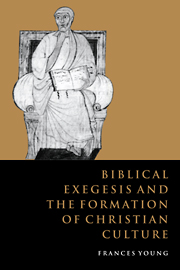Book contents
- Frontmatter
- Contents
- Preface
- List of abbreviations
- Introduction
- PART I EXEGESIS AND THE UNITY OF THE SCRIPTURES
- PART II THE BIBLE AS CLASSIC
- 3 Cultures and literatures
- 4 The advent of scholarship
- 5 Bible and culture
- PART III LANGUAGE AND REFERENCE
- PART IV THE BIBLE AND THE LIFE OF FAITH
- Conclusion and retrospect: towards an outline historical account
- Bibliography
- 1 Index ofbiblicaI references
- 2 Index of modern scholars
- 3 Index of subjects
5 - Bible and culture
Published online by Cambridge University Press: 02 December 2009
- Frontmatter
- Contents
- Preface
- List of abbreviations
- Introduction
- PART I EXEGESIS AND THE UNITY OF THE SCRIPTURES
- PART II THE BIBLE AS CLASSIC
- 3 Cultures and literatures
- 4 The advent of scholarship
- 5 Bible and culture
- PART III LANGUAGE AND REFERENCE
- PART IV THE BIBLE AND THE LIFE OF FAITH
- Conclusion and retrospect: towards an outline historical account
- Bibliography
- 1 Index ofbiblicaI references
- 2 Index of modern scholars
- 3 Index of subjects
Summary
The fact that education was premissed on the imitation of classics meant that intertextuality was an important feature of ancient literary culture. Allusions and quotations laced the correspondence of the literary élite, as well as public discourse. By the fourth century, Christian leaders such as the Cappadocians, or even The odoret of Cyrus, evidence the same literary culture. But they also quote the Bible. The purpose of this chapter is to explore use of the Bible in a Christianised literary form, namely panegyric, at the point of confluence between cultures that we reached at the end of chapter 3.
In English and French, ‘panegyric’ is associated with eulogy and may therefore be deemed to cover most of what the ancients would have called epideictic oratory. Strictly speaking, of course, it should refer simply to festival orations, but in ecclesiastical literature something of a practical convergence of these forms took place with the development of feast days for saints and martyrs. It is generally agreed that the Cappadocians and John Chrysostom exemplify the adaptation of funerary orations, eulogies and festal declamations to Christian purposes.
What I propose to examine, then, is the use of the Bible in such material.
- Type
- Chapter
- Information
- Biblical Exegesis and the Formation of Christian Culture , pp. 97 - 116Publisher: Cambridge University PressPrint publication year: 1997



